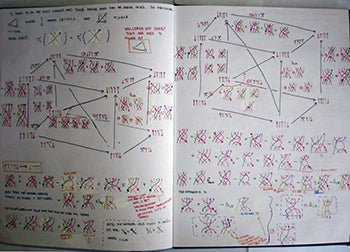Lauda Receives Simons Fellowship
If there’s one thing every researcher could benefit from, it’s time. And as a recipient of the 2015 Simons Foundation fellowship, that’s exactly what Professor of Mathematics Aaron Lauda is getting.
The Simons Fellowship provides funding that allows researchers to take a full year of academic leave, increasing their potential to make important breakthroughs. This year’s group includes 40 awardees from the United States and Canada.
Lauda has done extensive work on mathematical structures called “categorified quantum groups.” He will use the 2016 fellowship to develop applications of these structures in mathematics and theoretical physics.
The Simons Foundation supports leading researchers in mathematics, theoretical physics and neuroscience through their annual fellowships. The foundation was established by James H. Simons, a mathematician and investor who received a USC honorary degree in 2014.
Lauda will spend part of the year at Columbia University, collaborating with a former colleague there to continue research initiated in 2008. He also plans to spend several months at ETH Zurich where he will hold a guest professorship funded by a Swiss National Science Foundation grant in mathematical physics. Lauda will give master courses in the areas of representation theory, topological quantum field theory and categorification.
Broadly speaking, Lauda said his research is in theoretical mathematics. As a theoretical mathematician his research focuses on proving theorems and developing new mathematical tools rather than modeling a system using existing mathematics, as is typically done in applied mathematics.

These calculations from Aaron Lauda’s notebooks are working to categorify the internal braid group action on a quantum group. Figure courtesy of Aaron Lauda.
“We think of our day-to-day world as being three-dimensional, but if you think of time as another dimension then the world we live in is actually four-dimensional,” Lauda said. “Einstein’s theory of special relativity teaches us that in our universe, space and time get mixed together, so it’s important to study physics in this 4-D setting.”
Consequently, the necessity arises to be able to distinguish one 4-D shape from another, which can be quite a challenging problem.
“My research develops the mathematical tools needed to study these 4-D surfaces.”
A quantum group is an algebraic structure that can be used to distinguish different 3-D shapes. In the 1990s, mathematician Igor Frenkel conjectured the existence of categorified quantum groups — a more sophisticated algebraic structure generalizing quantum groups that would be useful for distinguishing 4-D surfaces.
Lauda and Columbia University collaborator Mikhail Khovanov proved part of Frenkel’s conjecture in 2008 by actually constructing these categorified quantum groups. During his fellowship, Lauda will continue his collaboration with Khovanov, attempting to use these newly discovered objects to create a mathematical tool for distinguishing 4-D shapes.
Over the last several years, Lauda has continued to prove theorems and develop an understanding of these structures. Given that it’s such a young subject with applications in many different areas within mathematics and theoretical physics, he thinks it’s time for a graduate-level textbook about this subject. Taking time to write such a volume was part of his fellowship proposal.
“Having endured the many pitfalls and wrong turns on the road to discovering categorified quantum groups, I think I have special insight about them and a perspective that I’d like to share.”
This Fall, in USC Dornsife’s mathematics department, Lauda will be teaching a graduate course on this subject, which will help him organize an approach for the textbook before beginning the Simons Fellowship. His writing will continue throughout 2016.
“The Simons Foundation is doing incredible work for mathematics,” Lauda said. “There are not a lot of places that support fundamental science — so much of our world is results-based — but what we sometimes forget is that the theoretical discoveries of today often fuel the discoveries of tomorrow.”